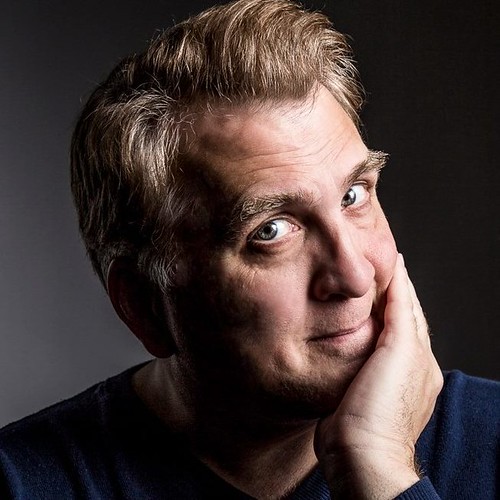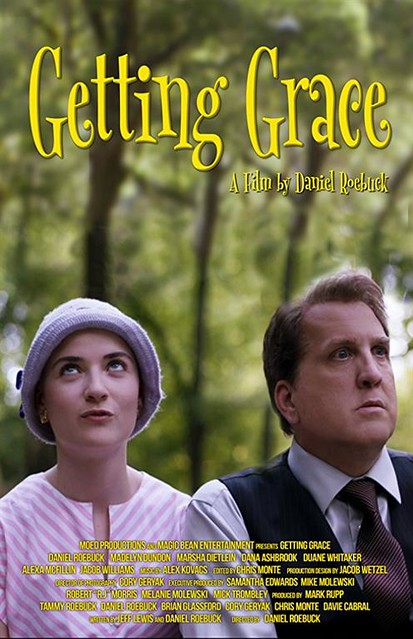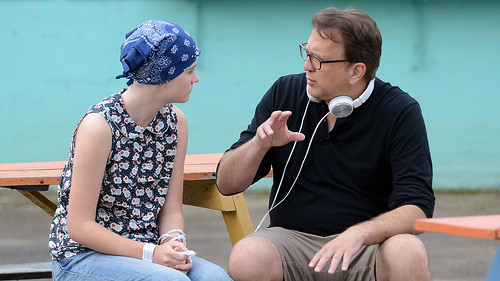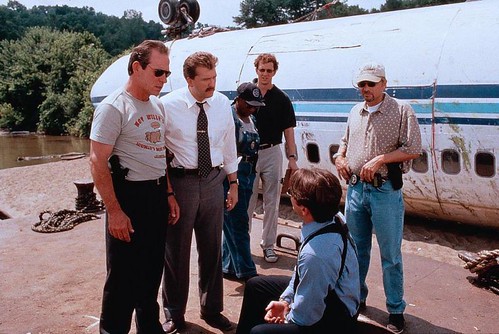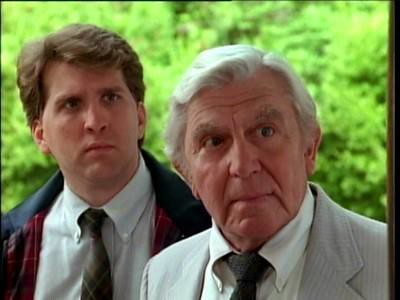Movies & TV / Columns
411 talks w/Daniel Roebuck About His New Movie Getting Grace
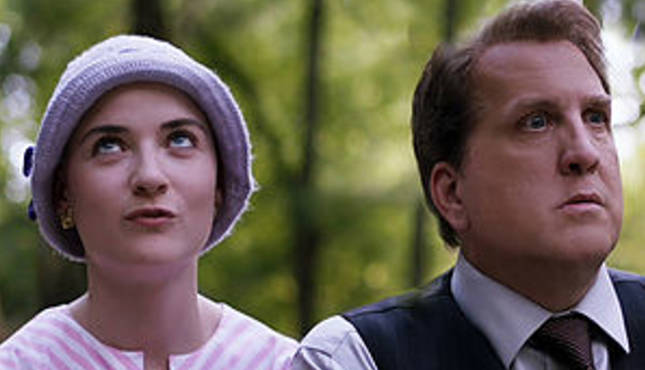
The 411 Interview: Daniel Roebuck
Daniel Roebuck is an actor, writer, and director who has been working in the entertainment world for over thirty years. He’s worked in movies, big budget (The Fugitive, U.S. Marshals, Agent Cody Banks) and low budget (Bubba Ho-Tep, Terror Eyes, John Dies at the End), and all sorts of TV (Matlock, Lost, Glee, CSI, and that’s just off the top of my head. You can check out Roebuck’s imdb page for the full list. Dude’s been in everything). Roebuck’s feature film directing debut, Getting Grace, is currently in theaters around the country (check out my review of the movie, a terrific, dark edged family comedy, here). In this interview, Roebuck speaks with this writer about making Getting Grace, his career in show business, and more.
**
Bryan Kristopowitz: How did you get involved with Getting Grace?
Daniel Roebuck: Nine years ago, Jeff Lewis’ wonderful script titled Bending Spoons came to me from a producer named Mark Rupp. Mark initially wondered if I might consider acting in the film, but I immediately realized that Bending Spoons had a greater destiny in store for me. His script was so original and fun, and the main character of Grace was so much like my own daughter, ironically named Grace, that I was hooked from the get go.
BK: Why did you want Getting Grace to be your feature film directing debut?
DR: So many ideas have come and gone, but I really felt strongly that moving forward from my comfortable existence as a working character actor to the much more pressurized job of film director had to be attached to a story worth the leap and aggravation. Getting Grace provided me with a story no one had ever seen before and gave me the chance, to not only move forward on my own career path, but to create something absolutely unique.
BK: How long did it take to get Getting Grace made, from finishing the script to getting a distribution deal?
DR: I think it’s easier to start with the fact that I got my hands on Bending Spoons nine years ago and it took a number of years to rewrite it. But if you need more specificity, I would say it was about three years from finished script to the theater screen.
BK: How did you cast Madelyn Dundon as Grace?
DR: I’d like to take full and complete credit for casting Madelyn Dundon as Grace, but that would insinuate the thing that really happened didn’t happen, which is simply, Madelyn Dundon was destined to play Grace and I was just smart enough to recognize she was the only person to play Grace! We auditioned many actresses, but she was the only Grace that actually walked into the room. Ironically, Madelyn and I share an alma mater (Bethlehem Catholic HS) and I once directed her father in a play when he was 13 years old. It was simply meant to be.
BK: How was it filming in Pennsylvania? Did you always intend to film in Pennsylvania? How did you choose your locations? What was the hardest location to obtain that you used? The easiest?
DR: Well from the moment I got my hands on the original script, I knew in my heart it was meant to be filmed in Pennsylvania. Having grown up in Bethlehem and the Lehigh Valley that surrounds it, makes a strong impression on a person, not just because it looks unique and amazing there, but the people there are also amazing. In my own rewrites in the script, I began setting the action in locations specific to Bethlehem. Instead of writing “Interior, Hot Dog Shop” I wrote “Interior, Pete’s Hot Dogs” because I had eaten there so many times I knew exactly where I could put the camera. The hardest location we always figured would be the hospital, but then St. Luke’s partnered with us and gave us a wonderful opportunity to not only shoot in their facilities, but brand their organization in our movie. The easiest location was Monocacy Park because I literally grew up there. As a child my parents would take us there to feed the ducks and it holds a special place in my heart for so many memories. So there was no doubt that the park and the waterfall needed to be in our movie.
BK: Is it difficult to act and direct at the same time? How do you prepare yourself to do both?
DR: I’d say that is more difficult to act and produce at the same time, because of my involvement on so many levels. Producing requires constant decision making. Directing requires less decision making, and acting the least amount of decisions. The greatest preparation for the undertaking was surrounding myself with an extraordinary team of people I trusted implicitly, not the least of which was my wife Tammy. I also had my talented brother-in-law, Cory Geryak, lensing the movie for me, and many other producers who had my back.
BK: How competitive is the “faith based”/”inspirational” movie business? As a genre it seems to be growing every year.
DR: I could never claim to be an expert in the “faith-based” genre. I personally think Getting Grace is a “faith-filled” movie, more than a faith-based movie. That said, I’m grateful, that people of faith are drawn to our film’s message of the availability of God’s grace to all and the celebration of his gifts to us.
I’ve lived in that space as an actor, but this is my first foray as a filmmaker. What I will say is that there is great inconsistency in the quality of faith-based movies, which is very unfortunate. Why is that? One of the greatest worries I have about it is that if faith-based audiences are too narrow-minded about what they require for entertainment, they will most certainly scare away talented filmmakers, writers and actors who understand, within the artistic gift that God gave them, that for something to be truly entertaining it requires an element of surprise. You see, if we can’t surprise the audience and they demand a specific outcome based primarily and only on their faith, then they will get the movies they deserve. As a guy who recently moved from actor to artist, the gauntlet I throw down is… ask for a certain reality in the storytelling and you’ll get better stories. But if you require limited storytelling, then you will get substantially less entertaining faith-based movies. And really what is the purpose of making a movie with a faith element? Is it to preach to the choir, or is it to preach to the guy who doesn’t go to church and get him to consider joining the choir? I would much rather bring a non-believer to the possibility of divinity than make a boring movie that will only be appreciated by a very small number of people. It’s God’s plan, as I see it, that any movie can serve as a missionary tool, but we always have to capture the audience from the perspective of entertaining them initially, before we teach them ultimately.
BK: How did you develop your interest in horror movies and the horror genre, your favorite genre according to your biography on imdb? Do you ever plan on directing a horror movie one day?
DR: I was attracted to horror films through the Universal Studios gothic horror movies of the 30s and 40s. Admittedly, I’ve been part of many horror movies over the last few decades, but it’s really in the old-fashioned black and white movies that my allegiance lies. I probably only watched the original Halloween once or maybe twice, but the original Bride of Frankenstein at least 50 times. Because my primary interest as a filmmaker is to make the world better, a horror film as we know them in the modern cinematic parlance, is not really in my wheelhouse. A comedy film with horrific elements could be; but an out and out horror movie… not really. Plus, making a good horror film is so much harder than anyone can imagine.
BK: You’ve been working in Hollywood for over three decades. How has the business changed since you started? How has the rise of television in recent years changed things?
DR: Imagine that when I got to Hollywood in 1984 they were only making movies on film, and now we make them on phones. The technology has changed so rapidly, it’s like if you had come to Hollywood in 1900 as a theater actor and watched the advent of motion pictures move to pictures with sound and then pictures with color. I always laugh and say, “I literally live and work as an actor in a medium that didn’t exist when I became an actor (video games).” Certainly television with outlets such as Netflix, Hulu and Amazon have multiplied the amount of shows produced, however, oddly I have not personally seen it multiply the amount that I work. Now maybe that is because I already work a lot, and there is only such much you can do, but I do think that television was the secondary objective for actors, but now it’s the primary objective.
BK: You were fabulous in The Fugitive and its sort of sequel U.S. Marshals. To your knowledge, was U.S. Marshals going to be the first in several U.S. Marshals movies or was it always meant to be a “one-and-done” kind of thing?
DR: It was everyone’s hope that the U.S. Marshals could be an ongoing enterprise. I remember feeling bad that Tom Wood’s character was killed when we shot it because many of us had anticipated the potential of other films. Ultimately, I think personally, U.S. Marshals’ story was way too complicated and had missed the sheer simplicity of the Les Miserable, the fugitive. Once Wesley Snipes switched to the third wig I knew we were in trouble. I did enjoy reuniting with the cast and working with legendary editor Stuart Baird, whose skilled editorial talents were always appreciated by me.
BK: I loved you on Matlock. What was it like working on that show and with its star, TV legend Andy Griffith?
DR: Matlock was a dream come true for a boy from Bethlehem who grew up watching classic TV like The Andy Griffith Show. It was truly three of the best years of my life, because it was three of the most artistically fulfilling years working alongside Andy, as well as the talented directors, co-stars and guest actors. Andy went out of his way to put me on that show, and I will forever be grateful.
BK: Any upcoming projects you can tell us about?
DR: We are beginning to work on our next feature film to be shot in the Lehigh Valley called The Hail Mary. We hope to film this year. I am also finishing up writing the horror parody that I eluded to earlier. I can sneak more information on that to you later, but trust me when I say it will make you laugh.
BK: Are you going to be in Rob Zombie’s next movie?
DR: I am going to reprise my role of Morris Green in Mr. Zombie’s 3 From Hell. Although, I will only appear in it briefly, I am pleased to work with Mr. Zombie and my friend, the actor Jeff Daniel Phillips.
BK: Have you ever tried to bend spoons with your mind in real life?
DR: That’s a great question. I remember as a boy watching Uri Geller and thinking that he was cool and it was so cool that he could do such things. I learned since that he was just another magician with no special powers, so I don’t remember trying to bend a spoon with my mind, because my own faith is quite strong, and the only thing bending a spoon would do would aggravate the people who have to put them back in a drawer. But sharing God’s “grace” with the world probably wouldn’t aggravate anyone except the Devil. And who cares, because he is already crabby.
**
A very special thanks to Daniel Roebuck for agreeing to participate in this interview and to david j. moore for helping set it up.
Check out the Getting Grace website here, Instagram page here, and Facebook page here.
Check out Daniel Roebuck’s official website here and Facebook page here.
Daniel Roebuck directing Madelyn Dundon image from The Morning Call.
Getting Grace poster from Wild About Movies.
All other images from the Daniel Roebuck Facebook page.


